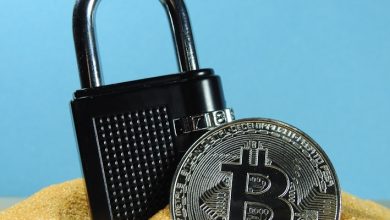How to Secure Your Crypto Assets: A Comprehensive Guide

- Understanding the importance of securing your crypto assets
- Best practices for storing your private keys
- Choosing the right wallet for your crypto assets
- Utilizing two-factor authentication for extra security
- Protecting your assets from phishing and malware attacks
- Creating a backup plan for your crypto assets
Understanding the importance of securing your crypto assets
Cryptocurrency is a valuable asset that requires careful protection. Securing your crypto assets is crucial to safeguarding your investment and ensuring peace of mind. By taking the necessary precautions, you can minimize the risk of theft and unauthorized access to your funds.
One of the most important aspects of securing your crypto assets is to use a secure wallet. Choose a reputable hardware or software wallet that offers advanced security features such as encryption and multi-factor authentication. Avoid storing large amounts of cryptocurrency on exchanges, as they are more vulnerable to hacks.
It is also essential to keep your private keys secure. Your private keys are like the keys to your digital safe deposit box, and anyone who gains access to them can control your funds. Store your private keys offline in a safe place, such as a hardware wallet or a secure USB drive.
Furthermore, be cautious when sharing information about your crypto holdings online. Avoid discussing specific details about your assets or transactions in public forums or social media platforms. Hackers can use this information to target you and attempt to steal your funds.
In conclusion, understanding the importance of securing your crypto assets is crucial for protecting your investment. By using secure wallets, keeping your private keys safe, and being mindful of sharing sensitive information online, you can reduce the risk of theft and ensure the safety of your cryptocurrency holdings.
Best practices for storing your private keys
When it comes to securing your cryptocurrency assets, one of the most crucial steps is to properly store your private keys. Private keys are essentially the passwords that allow you to access and manage your digital assets. Here are some best practices to follow when storing your private keys:
- Use a Hardware Wallet: Consider investing in a hardware wallet, a physical device that securely stores your private keys offline. This is widely considered one of the safest options for storing your keys.
- Backup Your Keys: Make sure to create backup copies of your private keys and store them in a safe and secure location. This will ensure that you can still access your assets even if your primary key is lost or damaged.
- Avoid Storing Keys Digitally: While it may be convenient to store your keys on your computer or phone, this can also make them more vulnerable to hacking or malware. It is recommended to keep your keys offline whenever possible.
- Use Strong Passwords: When creating passwords for your wallets or key backups, make sure to use strong and unique combinations of letters, numbers, and special characters to enhance security.
- Keep Your Keys Private: Avoid sharing your private keys with anyone else, as this could potentially compromise the security of your assets. Only share your keys with trusted individuals if absolutely necessary.
By following these best practices for storing your private keys, you can better protect your cryptocurrency assets from theft or unauthorized access. Remember that the security of your private keys is paramount to the security of your entire crypto portfolio, so take the necessary precautions to keep them safe.
Choosing the right wallet for your crypto assets
When it comes to securing your crypto assets, choosing the right wallet is crucial. There are several types of wallets available, each with its own set of features and security measures. It is essential to consider your specific needs and preferences when selecting a wallet to ensure the safety of your digital assets.
One option is a hardware wallet, which is a physical device that stores your crypto assets offline, making it less vulnerable to hacking. These wallets are considered one of the most secure options available and are ideal for long-term storage of large amounts of cryptocurrency.
Another option is a software wallet, which is a digital wallet that can be accessed via a computer or mobile device. While software wallets are convenient and easy to use, they are more susceptible to hacking and other security threats. It is important to choose a reputable software wallet provider to minimize these risks.
A third option is a paper wallet, which is a physical document that contains your public and private keys. Paper wallets are considered highly secure since they are not connected to the internet. However, they can be easily lost, damaged, or stolen, so it is essential to keep them in a safe place.
Ultimately, the best wallet for your crypto assets will depend on your individual needs and preferences. It is essential to research different wallet options thoroughly and choose one that offers the right balance of security and convenience for you. By taking the time to select the right wallet, you can ensure that your crypto assets are safe and secure.
Utilizing two-factor authentication for extra security
One effective way to enhance the security of your crypto assets is to utilize two-factor authentication (2FA). 2FA adds an extra layer of protection by requiring not only a password and username but also something that only the user has on them, such as a piece of information only they should know or have immediately to hand – such as a physical token or a mobile phone. This significantly reduces the chances of unauthorized access to your crypto accounts.
Protecting your assets from phishing and malware attacks
Protecting your assets from phishing and malware attacks is crucial in ensuring the security of your crypto holdings. Phishing scams involve fraudulent attempts to obtain sensitive information such as passwords or private keys by posing as a legitimate entity. Malware attacks, on the other hand, involve malicious software designed to disrupt, damage, or gain unauthorized access to your computer system.
To protect your assets, it is essential to be vigilant and follow best practices to prevent falling victim to these threats. Here are some tips to help you secure your crypto assets:
- Enable two-factor authentication (2FA) on all your accounts to add an extra layer of security.
- Avoid clicking on suspicious links or downloading attachments from unknown sources.
- Keep your devices and software up to date to patch any vulnerabilities that could be exploited by attackers.
- Use a reputable antivirus program to scan for and remove any malware on your devices.
- Store your private keys securely offline in a hardware wallet to protect them from online threats.
By following these precautions and staying informed about the latest security threats, you can minimize the risk of falling victim to phishing and malware attacks and keep your crypto assets safe and secure.
Creating a backup plan for your crypto assets
One of the most crucial aspects of securing your crypto assets is creating a backup plan. It is essential to have a plan in place to protect your investments in case of unforeseen circumstances such as hacking or hardware failure. By having a backup plan, you can ensure that your assets are safe and easily recoverable.
There are several ways to create a backup plan for your crypto assets. One option is to use a hardware wallet, which is a physical device that stores your private keys offline. This provides an extra layer of security as it is not connected to the internet, making it less vulnerable to hacking. Another option is to store your private keys in a secure location, such as a safe deposit box or a safe at home.
It is also important to regularly backup your wallet and private keys. This can be done by exporting your wallet file or mnemonic seed phrase and storing it in multiple secure locations. By regularly updating your backups, you can ensure that you can always access your assets, even if your primary storage method fails.
In addition to creating backups, it is crucial to test your recovery process to ensure that you can successfully recover your assets in case of an emergency. This can involve practicing restoring your wallet from a backup or mnemonic seed phrase to ensure that you are familiar with the process and can do it quickly and efficiently when needed.
By creating a backup plan for your crypto assets, you can protect your investments and ensure that you can easily recover them in case of any unforeseen events. Taking the time to create a backup plan now can save you a lot of stress and potential loss in the future.



